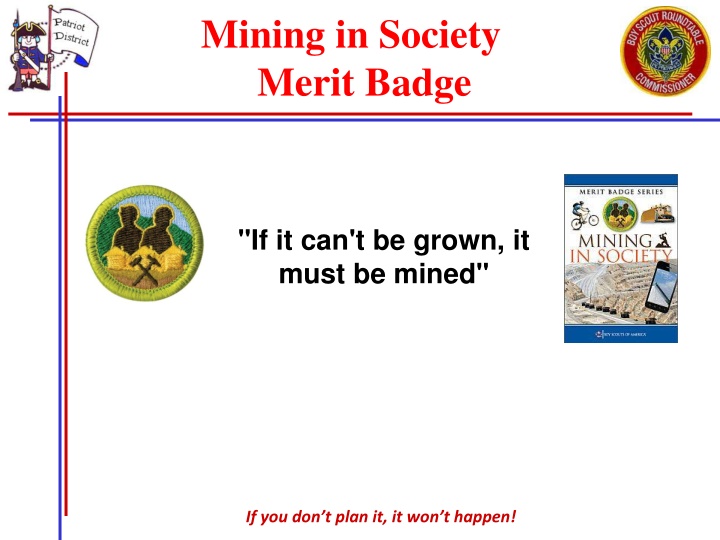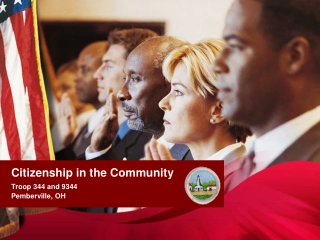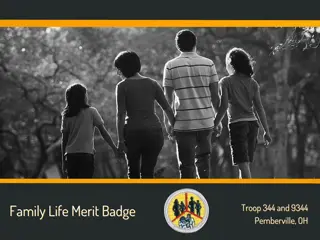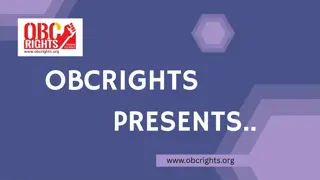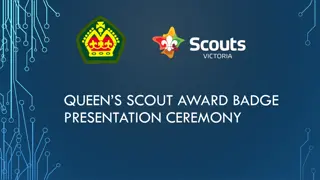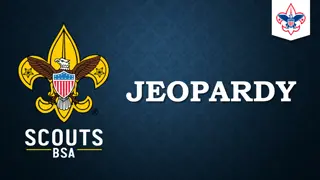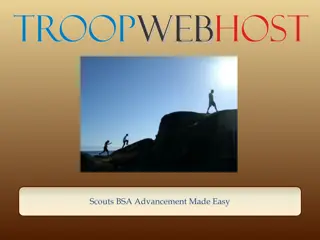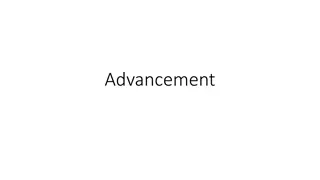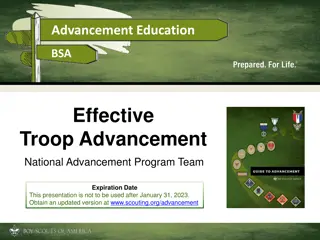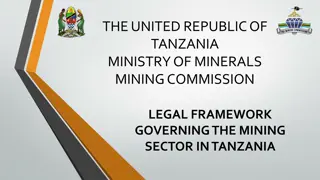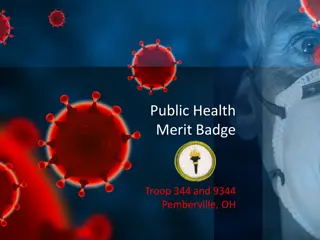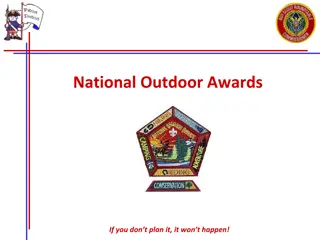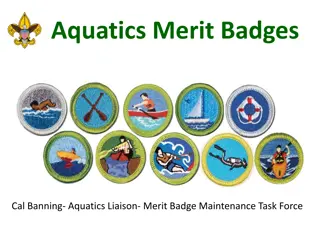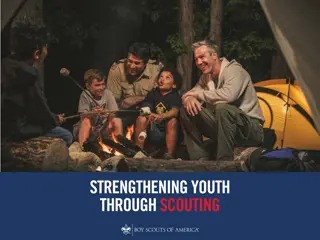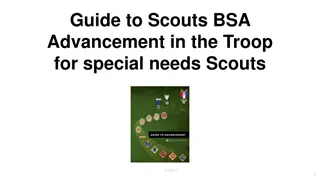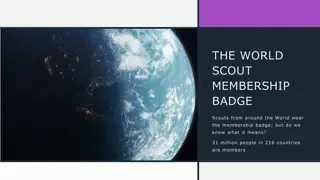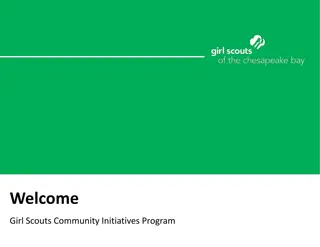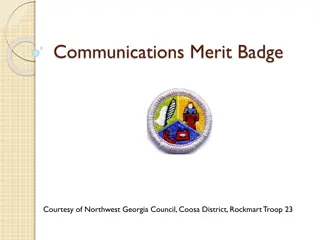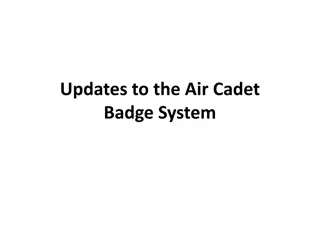Importance of Mining in Society through the Boy Scouts' Mining in Society Merit Badge
Explore the significance of mining in our daily lives and the impact it has on modern technology, such as cell phones. Discover the history of the Mining in Society Merit Badge reintroduced by the Boy Scouts of America and the efforts to educate scouts about mining practices and careers. Learn about the valuable minerals sourced globally and the importance of responsible recycling practices for electronic devices like cell phones. Find resources on developing merit badge counselors and supporting scouts in earning this badge.
Download Presentation

Please find below an Image/Link to download the presentation.
The content on the website is provided AS IS for your information and personal use only. It may not be sold, licensed, or shared on other websites without obtaining consent from the author.If you encounter any issues during the download, it is possible that the publisher has removed the file from their server.
You are allowed to download the files provided on this website for personal or commercial use, subject to the condition that they are used lawfully. All files are the property of their respective owners.
The content on the website is provided AS IS for your information and personal use only. It may not be sold, licensed, or shared on other websites without obtaining consent from the author.
E N D
Presentation Transcript
Mining in Society Merit Badge "If it can't be grown, it must be mined" If you don t plan it, it won t happen!
Mining in Society Q: Why is a mining-related badge only now being introduced by the Boy Scouts of America? A: The original Mining badge was created in 1911 and discontinued in 1937 due to lack of Scouts electing to earn the badge. Efforts to reinstate a mining-related badge have resulted in the Mining In Society Merit Badge s launch in 2014. The badge focuses on the importance of mining in our everyday lives and introduces Scouts to the components of mining and careers in mining. In order for this badge to succeed, it needs enthusiastic and knowledgeable Scout Leaders and Counselors to encourage Scouts to earn this badge. If you don t plan it, it won t happen!
Mining in Society Is Mining Important? You Decide! If you don t plan it, it won t happen!
Mining in Society If you don t plan it, it won t happen!
Mining in Society To put this in a more practical view: What s in my Cell Phone? Silver (circuitry). Mined in Peru, Mexico, China, Australia, Chile, Russia, United States, Poland, Bolivia and Canada. Tungsten (circuitry). Mined in China, Russia, Canada, Austria, Bolivia and Portugal. A multitude of petroleum products are used in cellular phones. Arsenic (gallium arsenide in the amplifier and receiver). Mined in China, Chile, Morocco, Peru, Kazakhstan, Russia, Belgium and Mexico. Copper (circuitry). Mined in Chile, United States, Peru, China, Australia, Russia, Indonesia, Canada, Zambia, Poland, Kazakhstan and Mexico. Gallium (gallium arsenide). Mined in China, Germany, Kazakhstan and Ukraine. Gold (circuitry). Mined in China, United States, Australia, South Africa, Peru, Russia, Canada, Uzbekistan, Ghana, Papua New Guinea, Indonesia, Brazil, Mexico and Chile. Magnesium compounds (phone case). Mined in China, Turkey, North Korea, Russia, Slovakia, Austria, Spain, Australia, Brazil, Greece, India and the United States. Palladium (circuitry). Mined in Russia, South Africa, Canada, United States and Zimbabwe. Platinum (circuitry). Mined in South Africa, Russia, Canada, Zimbabwe, United States and Colombia. INTERESTING FACTS About 130 million cell phones are retired annually in the United States. Collectively, these cell phones weigh about 14,000 metric tons. Annually retired cell phones contain almost 2,100 metric tons of copper, 46 metric tons of silver, 3.9 metric tons of gold, 2 metric tons of palladium, and 0.04 metric tons of platinum. Recovery and recycling of cell phones are in the early stages of development, as is the case for recycling of electronics in general. For cell phone recycling to grow, recycling must become economically viable. Efficient recovery infrastructure, product designs that simplify dismantling, and other changes are needed to facilitate the growth of cell phone recycling. Gallium arsenide is used in the amplifier and receiver. Magnesium compounds are alloyed to make the cell phone cases. If you don t plan it, it won t happen!
Mining in Society Partnered with the Boy Scouts to design and launch this merit badge Their Website: https://www.mineralseducationcoalition.org/ Will help you develop MB counselors and give you tip on how to help your scouts obtain this MB If you don t plan it, it won t happen!
Mining in Society 1. Do the following: a. Select 10 different minerals. For each one, name a product for which the mineral is used. b. Explain the role mining has in production and processing things that are grown. c. From the list of minerals you chose for 1a, determine the countries where those minerals can be found, and discuss what you learned with your counselor. 2. Obtain a map of your state or region showing major cities, highways, rivers, and railroads. Mark the locations of five different mining enterprises. Find out what resource is processed at each location, and identify the mine as a surface or underground operation. Discuss with your counselor how the resources mined at these locations are used. If you don t plan it, it won t happen!
Mining in Society 3. Discuss with your counselor the potential hazards a miner may encounter at an active mine and the protective measures used by miners. In your discussion, explain how: a. The miner s personal protective equipment is worn and used, including a hard hat, safety glasses, earplugs, dust mask or respirator, self-rescue device, and high-visibility vest. b. Miners protect their hands and feet from impact, pinch, vibration, slipping, and tripping/falling hazards. c. Monitoring equipment warns miners of imminent danger, and how robots are used in mine rescues. 4. Discuss with your counselor the dangers someone might encounter at an abandoned mine. Include information about the Stay Out Stay Alive program If you don t plan it, it won t happen!
Mining in Society 6. Do the following: a. Choose a modern mining site. Find out what is being done to help control environmental impacts. Share what you have learned about mining and sustainability. b. Explain reclamation as it is used in mining and how mine reclamation pertains to Scouting s no-trace principles. c. Discuss with your counselor what values society has about returning the land to the benefit of wildlife and people after mining has ended. Discuss the transformation of the BSA Summit Bechtel Family National Scout Reserve from a mine site to its current role If you don t plan it, it won t happen!
Mining in Society 7. Do ONE of the following: a. Explore the anticipated benefits of interplanetary mining. Learn how NASA and private investors may search for, extract, and process minerals in outer space, and the primary reasons for mining the moon, other planets, or near- Earth asteroids. Find out how exploration and mineral processing in space differ from exploration on Earth. Share what you have learned with your counselor, and discuss the difficulties encountered in exploring, collecting, and analyzing surface or near-surface samples in outer space. b. Identify three minerals found dissolved in seawater or found on the ocean floor, and list three places where the ocean is mined today. Share this information with your counselor, and discuss the chief incentives for mining the oceans for minerals, the reclamation necessary after mining is over, and any special concerns when mining minerals from the ocean. Find out what sustainability problems arise from mining the oceans. Discuss what you learn with your counselor. c. .. d. .. If you don t plan it, it won t happen!
